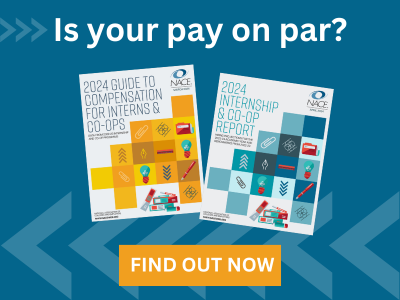Spotlight for Career Services Professionals
Spotlight for Recruiting Professionals
Although college hiring has indeed been hard hit by the COVID-19 pandemic, steps employers have taken have allowed them, at least to this point, to blunt its potential full impact.
In terms of the Class of 2021, employers expect to maintain hiring at 2020 levels. (See Figure 1.) There are a couple of considerations to weigh, including that:
- The outlook for Class of 2021 graduates is more positive than expected given that the pandemic shut down the economy, plummeted the stock market, and raised the unemployment rate.
- In several employment sectors—such as chemical (pharmaceutical) manufacturing, miscellaneous support services, information, and wholesale trade—organizations are increasing their college hiring, which is helping to drive the overall hiring outlook.
When coupled with other NACE research that shows the tremendous mobilization of college career services offices and employers engaged in university relations and recruiting, a more complete picture comes into focus of a field that has shifted its approaches and operations to meet—or at least account for—the challenges the pandemic has created.
Anecdotally, many NACE employer members point to the lessons they learned during the Great Recession of the late 2000s. Most notably, they understand the need to continue their college recruiting efforts so they do not lose ground in the market and have to restart their college recruiting at a disadvantage once the economy recovers.
Consider that while employers initially projected maintaining their college hiring at 2008 levels for the Class of 2009, that quickly changed as the economy nosedived in October 2008. In the end, employers reported that their college hiring fell off 22%.
There are some similarities between plans employers have for 2020-21 and those they had for 2009-10. This year, 16.5% of respondents are planning to increase their hires, nearly identical to the 16.9% that had these plans for 2009-10.
However, this year, 52.5% expect to maintain their hiring and 31.0% anticipate decreasing their hiring. This represents a noticeable shift from the 43.4% of respondents that intended to maintain hiring and 39.7% that expected to decrease hiring in 2009-10. In other words, nearly 10% more employers plan to maintain or increase their college hiring this year than they did in 2009.
The Job Outlook survey is a forecast of hiring intentions of employers as they relate to new college graduates. Each year, the National Association of Colleges and Employers (NACE) surveys its employer members about their hiring plans and other employment-related issues to project the market for new college graduates for the current class and to assess a variety of conditions that may influence that market. Data for the Job Outlook 2021 survey were collected from July 27, 2020, through September 11, 2020. This year, NACE not only surveyed 931 of its employer members, but it also surveyed 2,368 nonmember employer organizations. A total of 227 surveys were returned; 158 were NACE members and the remaining 69 were nonmembers. The Job Outlook 2021 report is available in MyNACE.
Figure 1: Job Outlook hiring projections, 2014 – 2021
| Recruiting Year | |
|---|---|
| 2021 | |
| Fall | -0.1% |
| Spring | NA |
| 2020 | |
| Fall | 5.8% |
| Spring | 6.3% |
| 2019 | |
| Fall | 16.6% |
| Spring | 10.7% |
| 2018 | |
| Fall | 4.0% |
| Spring | -1.3% |
| 2017 | |
| Fall | 5.8% |
| Spring | 5.0% |
| 2016 | |
| Fall | 11.0% |
| Spring | 5.2% |
| 2015 | |
| Fall | 8.3% |
| Spring | 9.6% |
| 2014 | |
| Fall | 7.8% |
| Spring | 8.6% |
| Recruiting Year | Fall | Spring |
|---|---|---|
| 2021 | -0.1% | NA |
| 2020 | 5.8% | 6.3% |
| 2019 | 16.6% | 10.7% |
| 2018 | 4.0% | -1.3% |
| 2017 | 5.8% | 5.0% |
| 2016 | 11.0% | 5.2% |
| 2015 | 8.3% | 9.6% |
| 2014 | 7.8% | 8.6% |






